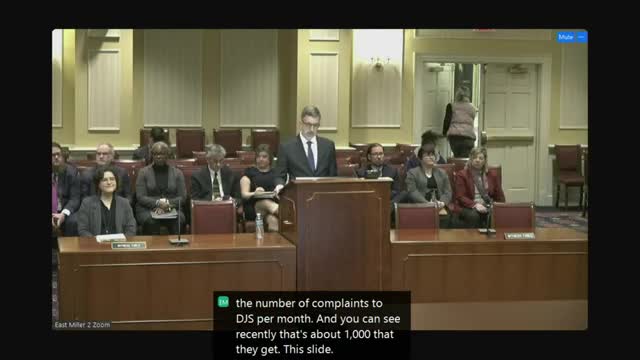DJS Secretary outlines Thrive Academy, girls continuum and data upgrades in response to OPEGA briefing
Get AI-powered insights, summaries, and transcripts
Subscribe
Summary
Department of Juvenile Services Secretary Vinny Schiraldi told the Judicial Proceedings Committee he has launched programs to target gun violence, girls' services and workforce pathways, secured federal and state funds, and is pursuing both short-term fixes and a longer-term replacement for the department's case-management system.
Vinny Schiraldi, secretary of the Department of Juvenile Services, responded to OPEGA's Jan. 15 briefing with a list of immediate and planned steps to expand community services, improve oversight and modernize data collection. DJS leaders said they have moved quickly since the secretary's 2023 arrival but acknowledged much work remains.
Schiraldi described a three-part focus: an intensive anti-gun-violence effort called the Thrive Academy, a planned continuum of services for girls, and expanded workforce-development and apprenticeship partnerships. He told the committee, “this is a oil tanker, not a riverine craft,” underscoring the agency's scale and the time needed to change its service mix.
Programs and funding
Schiraldi said an ARPA allocation and later General Assembly funding helped launch the Thrive Academy to target youth at high risk of gun involvement. He said the department obtained an $850,000 federal grant from the Office of Juvenile Justice and Delinquency Prevention for service scanning, gap analysis and technical assistance.
The secretary described other actions: - A new assistant secretary for community resources was appointed and tasked with mapping service gaps, improving provider rate-setting and expanding access to evidence-based services statewide. - A girls’ continuum of care and a request for proposals for gender-responsive services were being prepared after consultations with national experts, judges and practitioners. - Workforce programs and apprenticeships were expanded in partnership with the Maryland Department of Labor, local workforce boards and other state agencies; DJS reported summer and year-round subsidized work slots and partnerships to build training pipelines.
Data systems and evaluation
On data limitations identified by OPEGA, Schiraldi said DJS is exploring replacement of CJAMS and upgrades to ASSIST. He told the committee the CJAMS effort “was not meeting our needs” and that the department expects to issue a request for proposals for a modern case-management system; shorter-term fixes to quantify referrals and other inputs were underway.
Schiraldi said DJS has contracted with academic partners. Dr. Aaron Betzinger of the University of Maryland’s Institute for Innovation and Implementation described existing monitoring and dashboarding for evidence-based programs (multisystemic therapy and functional family therapy) and said DJS plans expanded evaluation work to track post-discharge arrests, disaggregate outcomes by race and supervision status, and assess program effectiveness for subgroups.
Secretary's framing and next steps
Schiraldi described the inherited service shortfalls and the department's near-term steps as part of a longer implementation plan: expand providers via expressions of interest, formalize new provider rate-setting, improve short-term quantification of noncontract referrals and pursue a new, modern case-management system within 18–24 months. He asked committee members to visit programs and agreed to provide follow-up data and documents requested by the committee.
